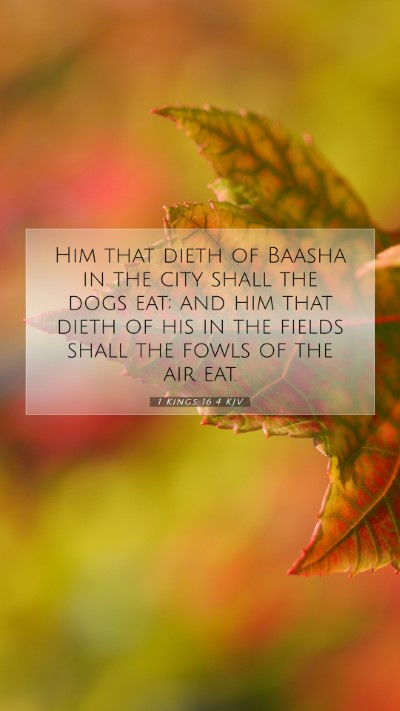Bible Verse Explanation: 1 Kings 16:4
The verse 1 Kings 16:4 states: "And him that dieth of Ahab in the city the dogs shall eat; and him that dieth in the fields shall the fowls of the air eat."
This verse comes as part of a prophecy concerning the wickedness of King Ahab and the judgment pronounced against his household. It reflects the dire consequences of Ahab's actions and sets the tone for not only the chapter but for the larger narrative of the kings of Israel who turned away from God.
Insights from Public Domain Commentaries
Matthew Henry's Commentary
Matthew Henry explains that this verse serves as a vivid depiction of the fate that awaits those who rebel against God. It signifies the complete disregard for royal burial rites and reflects the ultimate disgrace that Ahab’s family would face. His bloodline's violent end is a stark warning against the consequences of idolatry and rebellion.
Albert Barnes' Notes
Albert Barnes emphasizes that the prophecy illustrates God's judgment mechanism. The mention of dogs and birds feeding on the corpses signifies a curse, showing how far Ahab's legacy has fallen due to his covenant unfaithfulness. It underscores that those who oppose God's will will not find peace in life or death.
Adam Clarke's Commentary
Adam Clarke elaborates on the cultural implications. In ancient Israel, having a proper burial was essential for honor; thus, the absence of burial signifies ultimate judgment and dishonor. The prophecy also extends to the broader theme of accountability for one’s actions, particularly for leaders who influence the nation.
Thematic Reflections
1 Kings 16:4 speaks volumes about divine justice. It presents God as a righteous judge, who not only sees the wrongdoings of powerful leaders but ensures their judgment. This reinforces the biblical perspective of accountability and the call to align with God's will.
Related Bible Cross References
- 1 Kings 21:19 - Highlights prophetic condemnation of Ahab’s actions.
- 2 Kings 9:10 - Confirms the fulfillment of the prophecy concerning Ahab's family.
- 1 Kings 14:11 - Similar themes of disgrace for the house of Jeroboam.
Application and Contemporary Relevance
For today's believers, this verse carries a weighty reminder about the importance of leadership integrity and the significant impact of one's choices. In a world filled with moral ambiguity, 1 Kings 16:4 encourages individuals to seek righteousness and to consider the long-term consequences of their actions, both personally and in their communities.
Conclusion
In pondering 1 Kings 16:4, we engage in a profound Bible study that generates important Bible verse meanings and Bible verse interpretations. It encourages not only a deeper understanding of Scripture but also invites us to reflect on the overarching themes of justice, accountability, and the legacy left by our actions. This exploration is vital for Bible study groups, online Bible study, and individual study journeys that seek to uncover the profound insights within the Scriptures.


